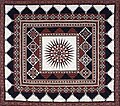
Marion is a city in and the county seat of Grant County, Indiana, United States, along the Mississinewa River. The population was 28,310 as of the 2020 census. It is named for Francis Marion, a brigadier general from South Carolina in the American Revolutionary War.
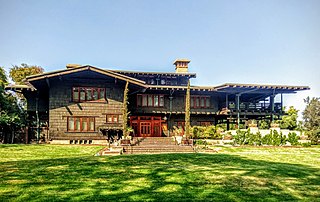
The Gamble House, also known as the David B. Gamble House, is an iconic American Craftsman home in Pasadena, California, designed by the architectural firm Greene and Greene. Constructed in 1908–1909 as a home for David B. Gamble, son of the Procter & Gamble founder James Gamble, it is today a National Historic Landmark, a California Historical Landmark, and open to the public for tours and events.

The Martin Luther King Jr. National Historical Park covers about 35 acres (0.14 km2) and includes several sites in Atlanta, Georgia related to the life and work of civil rights leader Martin Luther King Jr. Within the park is his boyhood home, and Ebenezer Baptist Church — the church where King was baptized and both he and his father, Martin Luther King Sr., were pastors — as well as, the grave site of King, Jr., and his wife, civil rights activist Coretta Scott King.
Marie Daugherty Webster was a quilt designer, quilt producer, and businesswoman, as well as a lecturer and author of Quilts, Their Story, and How to Make Them (1915), the first American book about the history of quilting, reprinted many times since. She also ran the Practical Patchwork Company, a quilt pattern-making business from her home in Wabash, Indiana, for more than thirty years. Webster's appliquéd quilts influenced modern quilting designs of the early twentieth century. Her quilts have been featured in museums and gallery exhibition in the United States and Japan. The Indianapolis Museum of Art holds the largest collection of her quilts in the United States. Webster was inducted into the Quilters Hall of Fame in 1991. The Marie Webster House, her former residence in Marion, Indiana, was listed on the National Register of Historic Places in 1992, was designated a National Historic Landmark in 1993, and serves as the present-day home of the Quilters Hall of Fame.

The Morris–Butler House is a Second Empire-style house built about 1864 in the Old Northside Historic District of Indianapolis, Indiana. Restored as a museum home by Indiana Landmarks between 1964 and 1969, the American Civil War-era residence was the non-profit organization's first preservation project. Restoration work retained some of its original architectural features, and the home was furnished in Victorian and Post-Victorian styles. Its use was changed to a venue for Indiana Landmarks programs, special events, and private rentals following a refurbishment in 2013. Regular daily tours of the property have been discontinued.

The James Whitcomb Riley Museum Home, one of two homes known as the James Whitcomb Riley House on the National Register of Historic Places, is a historic building in the Lockerbie Square Historic District of Indianapolis, Indiana. It was named a National Historic Landmark in 1962 for its association with poet James Whitcomb Riley (1849-1916), known as the "Hoosier poet".
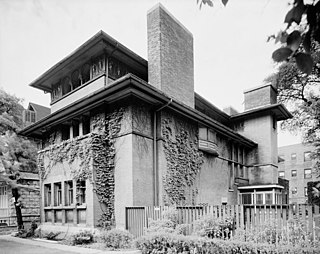
The Isidore H. Heller House is a house located at 5132 South Woodlawn Avenue in the Hyde Park community area of Chicago in Cook County, Illinois, United States. The house was designed by American architect Frank Lloyd Wright. The design is credited as one of the turning points in Wright's shift to geometric, Prairie School architecture, which is defined by horizontal lines, flat or hipped roofs with broad overhanging eaves, windows grouped in horizontal bands, and an integration with the landscape, which is meant to evoke native Prairie surroundings.

The Ida B. Wells-Barnett House was the residence of civil rights advocate Ida B. Wells (1862–1931) and her husband Ferdinand Lee Barnett from 1919 to 1930. It is located at 3624 S. Dr. Martin Luther King Jr. Drive in the Douglas community area of Chicago, Illinois. It was designated a Chicago Landmark on October 2, 1995. It was listed on the National Register of Historic Places and as a National Historic Landmark on May 30, 1974.
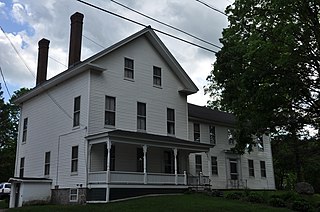
The Daniel Webster Family Home, also known as The Elms, is a historic house off South Main Street in West Franklin, New Hampshire. The house has been designated a National Historic Landmark for its importance as the summer home of Daniel Webster (1782–1852), who owned it from 1829 until his death.

The Highland Park Dentzel Carousel and Shelter Building is a carousel and building in Highland Park in Meridian, Mississippi. Manufactured about 1896 for the 1904 St. Louis Exposition by the Dentzel Carousel Company of Philadelphia, Pennsylvania, the carousel was sold and shipped to Meridian. Highland Park Dentzel Carousel has been in operation since 1909 and was declared a National Historic Landmark in 1987. It is the only remaining two-row stationary Dentzel menagerie in the world.

Lockerbie Square Historic District is a national historic district on the National Register of Historic Places within Indianapolis, Indiana, listed on February 23, 1973, with a boundary increase on July 28, 1987. It is noted for its Federal, Italianate, and Queen Anne style architecture. The original platting of Lockerbie Square, done by Jannett Smith Lockerbie McOuat and named for her father, Scottish immigrant George Murray Lockerbie, was between 1847 and 1850. The 1960s saw an immense effort to save the buildings within the district, becoming the first historic district in Indianapolis. Many of the buildings date from 1855 to 1930. James Whitcomb Riley, famed Hoosier poet, lived in the district for over two decades. He was known to give candy to local children on his regular walks.

The Willa Cather House, also known as the Willa Cather Childhood Home, is a historic house museum at 241 North Cedar Street in Red Cloud, Nebraska. Built in 1878, it is the house where author Willa Cather (1873–1947) grew up. Cather's descriptions of frontier life in Nebraska were an important part of literary canon of the early 20th century. The house was declared a National Historic Landmark in 1971. The house is one of eight structures that make up the Willa Cather State Historic Site, which is owned by the Willa Cather Foundation.

The National Park System preserves and interprets the history of women in American society. Many national parks, monuments and historic sites represent America's women's history as a primary theme, while numerous others address American women's history somewhere in their programs and preservation activities. The lists of sites below is not exhaustive, but includes sites closely related to themes in U.S. Women's History. Click here for an article on Women in the National Park Service.

This is a list of the National Register of Historic Places listings in Center Township, Marion County, Indiana.
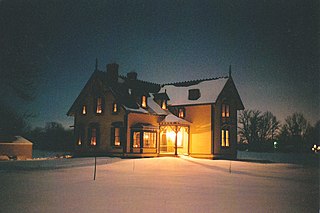
The Nicholson–Rand House is a historic house located in Decatur Township, Marion County, Indiana, in Indianapolis. It was moved by the Historic Landmarks Foundation of Indiana (HLFI) half a mile south to save it from being demolished in 1997 and added to the National Register of Historic Places in 2003. The house is an example of the Gothic Revival style of American architecture typified by Alexander Jackson Davis and Andrew Jackson Downing in the mid-19th century.
Nelle Elizabeth Nichols Peters (1884–1974) was one of Kansas City's most prolific architects.
Nancy Morrison Crow is an American art quilter and fiber artist. She is one of the leading figures in the development of the art quilting movement of the 1970s and 1980s, and is also known for her development of certain techniques to allow more spontaneity and expression.
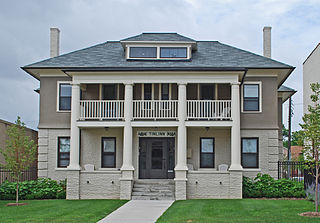
The Tinlinn Apartments is an apartment building located at 413 Garland Street in Flint, Michigan. The building was listed on the National Register of Historic Places in 2008.

Beth-El Zedeck Temple, originally known as Beth-El Temple, is a historic synagogue located in the Mapleton-Fall Creek neighborhood in Indianapolis, Indiana, United States. The building was completed in 1924, and was originally home to Congregation Beth-El before merging with the Ohev Zedeck congregation in 1928. It is the oldest remaining synagogue structure in Indianapolis.





















